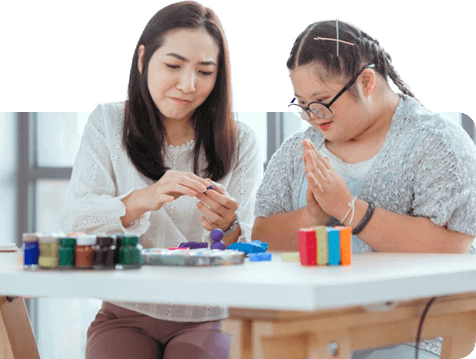Our services are tailored, with love & care, to meet your unique living experience.
Contact us to start your Rosie’s Love and Care journey.
Independent assessments (or IAs as they are sometimes shortened to) are a new tool that the NDIA may use to work out how your disability affects your life and what supports you need from the NDIS.
They will take the form of a meeting or series of meetings (either face to face or over video call) and will take between 1 and 4 hours.
The independent assessment will help them work out how much NDIS funding you will get in your plan.
At the moment, people need to seek and supply all the relevant supporting documentation to the NDIA. To do this, people meet with their regular healthcare providers to put this together. The good thing about this approach is that the healthcare providers are known to us so they understand our disabilities. The downside is that these appointments are often at our own cost, especially if you are not yet an NDIS participant.
If you go through an independent assessment an assessor independent to the NDIS will evaluate your needs and recommend funding. This does not cost you anything.
The NDIS have given a few reasons why they are looking to roll out independent assessments. Some of the main ones are:
* To make sure the NDIS is fair and equitable to everyone.
* So that people have more flexible plans.
* So you don't need to collect documentation to show the impact of your disability.
Here’s what the NDIS says on their website about independent assessments:
“Independent assessments are designed to make sure access to the NDIS is fair and equitable for new and existing participants. They’ll also provide more flexible plans which means greater choice and control for you, and better support to help you use your plan funding to pursue your goals and increase your independence.For you, an independent assessment will mean you don’t need to organise an assessment or collect evidence to show the impact of your disability, saving you time and money. Independent assessments will mean you have quick access to internationally recognised tools and qualified health professionals no matter where you live, or what your circumstances.”
“To make it more equalAt the moment, the Australian Bureau of Statistics has flagged that NDIS funding is not always fair and equitable. In fact, people who are well off socio-economically receive on average around $5000 more than those who are more socio-economically disadvantaged.”
As the name suggests, independent assessments are designed to be independent. That means they won’t be done and managed by the NDIS. Instead, independent assessments are going to be completed by an Independent Assessor.
The Independent Assessors don’t work for the NDIA. For these Independent Assessor roles, they are looking to hire qualified healthcare professionals who understand the needs of people with disability. People like Occupational Therapists, Psychologists and Physiotherapists can be an Independent Assessor.
Independent assessments won’t necessarily replace your regular planning meetings
At this stage, independentassessments won’t happen every time you do a planning meeting. At the moment, independent assessments are for people who are:
Going through a major change (like finishing school, moving out of home, or starting a new job).
Looking to gain access to the NDIS (someone who is not already a participant will most likely need to do an independent assessment).
The changes that the NDIS are proposing with independent assessments are pretty big, and it has many people in the sector concerned. Here are some of the main things that people are worried about when it comes to independent assessments.
How long would it take you to give someone a full snapshot of your life? What you can do, what you need, everything. 1 hour? 4 hours? A day? Multiple days? Since the concept of independent assessments was floated, many people in the Australian disability community have been worried that they won’t be comprehensive enough. The interviews will be based on a person’s capacity, so there is a chance that things might be missed.
Some early feedback from the pilot was that it included a lot of standardised tools and questions that were at times described as ‘invasive’ and did not offer an individualised approach. People in the pilot also noted that the questions were open to interpretation and not always relevant.
It is unclear whether people can appeal a decision made by an independent assessor. This is because the assessor is not part of the NDIS.
At the moment, there is lot’s of speculation but not so much that is concrete. It will largely be a case of waiting until everyone has the full picture. In the meantime, Rosie's Love and Care is always here to help. If you need more updated information, please contact us.
Contact us to start your Rosie’s Love and Care journey.
